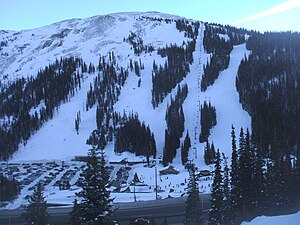It’s America Recycles Day, November 15th! It seems like most people try to recycle paper, plastics, glass, and more– but what do you think of recycled water?
Do you frequent the Denver Zoo? Denver Water provides recycled water to the zoo, Xcel Energy, several schools, golf courses and parks in Denver through their system of purple pipes. The system began operating in 2004 and will continue growing over the next decade.
According to Travis Thompson, media coordinator with Denver Water, “We are roughly halfway toward build-out. Once build-out is complete, the project will supply more than five billion gallons of recycled water every year– water for irrigation, for industrial use, for lakes in our parks and for golf courses– water we don’t have to take from a reservoir.”
Water recycling for irrigation and industrial uses is an option, but ski areas are also starting to recycle water.
In northern Arizona, the Arizona Snow Bowl Resort will be using reclaimed wastewater effluent for the first time this year for snow making– that will make the resort the first ever to use recycled and treated sewage effluent for 100 percent of its snowmaking. This recycling effort hasn’t come without struggle. A decade-long legal battle left Snow Bowl victorious in February 2012, after a coalition of environmental groups and American Indian tribes opposed the use of reclaimed water, considering it a desecration of sacred land or expressing concerns that chemicals left in the water could have ecological impacts. New research highlights additional human health concerns, as reported by the New York Times Green Blog.
Recycled water doesn’t always come from effluent. Colorado’s Loveland Ski Area is recapturing and recycling snowmelt water, reducing the amount of water that the resort draws from the stream for snowmaking. From ColoradoLawyer.com:
Loveland Ski Area in Colorado has taken an innovative approach to recapture and reuse snowmelt water. As result of being located in a water scarce area, water rights required to divert enough water to make needed snow are prohibitively expensive. Accordingly, Loveland sought governmental approval to recapture 70 percent of the snowmelt water from snowmaking by storing it in an off-site reservoir leased by Loveland. Releasing the stored water into the stream replaces stream water that was taken out and used for snowmaking at the area. As a result, the overall depletion of the stream by snowmaking is reduced. Loveland’s General Manager Ken Abrahamson also believes that this recycling and reuse of water is “the right thing to do, environmentally speaking, and goes hand-in-hand with the other kinds of recycling we now take for granted, like aluminum cans, glass bottles and other materials.
Read more about recycled water in Colorado in the upcoming January 2013 issue of Headwaters Magazine.
Is water recycling a good idea? A great idea? Healthy? Risky? Does it go hand-in-hand with the recycling we take for granted? What are other interesting water recycling projects going on in Colorado?



 Print
Print